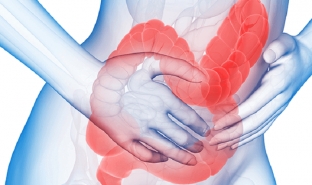Stressful working weeks, financial problems, personal troubles – Such unpleasant moments occur in the life of every person. But few people think that constant stress and lack of proper rest can negatively affect the work of the whole organism.
Irritable bowel syndrome is one of the pathologies of the gastrointestinal tract, which develops under the influence of a pathological condition of the central nervous system of the body. The symptoms of this disease can significantly affect the quality of life of a person, driving him into an even more stressful state, and the patient enters a kind of vicious circle.
Characteristic symptoms of irritable bowel syndrome
Irritable Bowel Syndrome is a chronic disease of the gastrointestinal tract, which is manifested by symptoms of impaired bowel function in the form of pain and discomfort in the abdomen, as well as signs of impaired defecation.
Do you know how to properly conduct: Shank Prokshalana - cleansing the body with salt water and exercises
At the same time, during the examination of the patient, no organic pathology of the gastrointestinal tract is detected. Signs of irritable bowel syndrome can bother a person for a long time, causing him considerable discomfort.

At the same time, the problem is so inconvenient for discussion that a person may deliberately refuse medical care for a long time.
Irritable bowel syndrome and what to do about it
- causes of irritable bowel syndrome;
- clinical presentation of irritable bowel syndrome;
- classification of the disease depending on the severity of symptoms.
Causes of irritable bowel syndrome
The exact causes of irritable bowel syndrome have not yet been established. During the examination of the patient, no organic lesions of the intestine are detected, so the diagnosis of irritable bowel syndrome is more of a diagnosis of exclusion. In the development of irritable bowel syndrome, a large role is given to pathogenetic factors.
Read: Cleansing the body is the best way to rejuvenate
Pathogenic factors that lead to irritable bowel syndrome
1. dysregulation of the activity of the central nervous system;
2. psychopathological abnormalities;
3. intestinal motility disorders;
4. disorders of visceral sensitivity;
5. post-infectious inflammatory reactions and dysfunctions of the immune system;
6. influence of food allergens.

Clinical presentation of irritable bowel syndrome
Depending on the predominance of certain symptoms in the clinical classification of irritable bowel syndrome, it is customary to distinguish the following pathology options:
- variant with a predominance of pain and flatulence;
- diarrhea predominate variant;
- variant with a predominance of constipation.
The disease can manifest itself discomfort and pain in the abdomen, constipation, diarrhea, significant bloating and flatulence, mucus with feces during bowel movements, a feeling of incomplete emptying of the intestine, rumbling in the abdomen.
Find out the information: How to cleanse the body deliciously
It is characteristic that all the symptoms of the pathology can occur regardless of food intake and disturb the patient throughout the day, while aggravating after stressful situations or focusing on emerging symptoms.

Classification of the disease according to the severity of symptoms
Depending on the severity of the clinical picture of irritable bowel syndrome, there are three main forms of pathology:
- mild form of irritable bowel syndrome – is the most common type of disease in which the symptoms are quite mild, occur infrequently or intermittently, are associated with the influence of stress factors that are closely related to altered bowel function;
- in the moderate form of irritable bowel syndrome, the symptoms occur intermittently, but in a somewhat more acute form and more often, sometimes leading to temporary disability of the patient;
Read more: Ideal Diet for Irritable Bowel Syndrome
- In severe irritable bowel syndrome, patients complain of persistent abdominal pain and other pronounced symptoms of pathology. At the same time, patients also have other psycho-emotional conditions, such as depression and anxiety, but often do not recognize them.







Add a comment